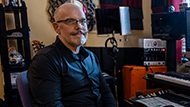Christopher Lee Simmonds – Tongue Cancer Patient Story

What Christopher Lee Simmonds thought was a canker sore on his tongue turned out to be something much worse – tongue cancer.
In August 2023, Christopher’s mouth would hurt when he ate or drank certain things. He gargled with a mouth rinse and the pain would subside, but it returned one month later.
“I thought it was on my throat, so I used my toothbrush to see it,” says Christopher. “But it was on my tongue, and I panicked. Something told me this wasn’t good, but I convinced myself it was no big deal. I thought maybe it was an infection from a cut.”
In October, he decided to visit UPMC Urgent Care in Robinson. Christopher was treated for a fungal infection and the care team recommended he see an ear, nose, and throat specialist.
He had a biopsy done, which revealed he had stage II tongue cancer. For the musician who sings and plays guitar, piano, and other instruments, Christopher says he was terrified of the diagnosis.
"I remember thinking ‘I'm going to lose my voice. I'm not going be able to sing. I'm not going to be able to play,’" he says.
Christopher next met with UPMC otolaryngologists and head and neck cancer surgeons Kevin Contrera, MD, MPH, and Matthew Spector, MD, FACS.
“My new situation was terrifying,” says Christopher, 53. “I said to myself ‘I was fine a month ago. And now I have cancer and must have surgery.’”
Dr. Contrera and Dr. Spector typically treat this type of cancer by surgically removing it and rebuilding the tongue using tissue from the patient’s wrist. However, this causes tendon exposure, wrist immobility, and often nerve injury.
"I said, ‘If I have nerve damage in my fingers and I can't sing, my purpose is gone.’ I felt hopeless.” says Christopher. “Dr. Contrera said ‘We aren’t going to let that happen.’”
Tailored Cancer Treatment
The surgeons alternatively used the tissue from Christopher’s upper arm to reconstruct his tongue during the four-hour procedure at UPMC Presbyterian.
Dr. Spector describes the surgery like a "self-transplant" with him and Dr. Contrera working together to eliminate the cancer and rebuild Christopher’s tongue.
"We don’t want to create a generic surgery for a generic disease. We try to individualize and customize a surgery so we may be more ambitious with certain surgical goals for patients who share that level of ambition," says Dr. Contrera.
Christopher also had lymph nodes and his salivary gland removed. He spent five days recovering in the hospital. During his stay, a volunteer and former cancer patient who had his jaw reconstructed from his leg visited Christopher.
“I had a totally different perspective from that point. Just from him being there, I knew I was going to be alright,” he says. The experience motived Christopher to want to do the same for patients in his situation.
Christopher’s recovery could take six months to a year. And, while he was able to speak the day after surgery, there are still subtle differences with how he sounded before surgery.
Back to Basics
He’s currently in speech and physical therapy at UPMC Rehabilitation Institute in Moon Township, close to his home in Sewickley. It’s back to basics for Christopher, who does vocabulary exercises where he practices annunciation, as well as tongue movements.
“It’s incredibly tiring, but my therapist Jacklyn and speech language pathologist Lauren have been so positive and encouraging,” says Christopher.
In addition to therapy, he’ll return for routine visits every three months during this first year post-surgery. In the meantime, Christopher is continuing to sing and play music; he even got back to recording just one month after his tongue was rebuilt.
“From my surgery until now, everything has gone incredibly well,” he says. “I had awesome surgeons and was surrounded by great nurses and staff.”
 UPMC
UPMC
 UPMC Children's Hospital of Pittsburgh
UPMC Children's Hospital of Pittsburgh
 UPMC Magee-Womens Hospital
UPMC Magee-Womens Hospital
 UPMC Immune Transplant and Therapy Center
UPMC Immune Transplant and Therapy Center

